Arthur Miller's The Crucible remains alarmingly relevant today, especially in light of the current political landscape that seems to mirror the hysteria of the Salem witch trials. Staged in 1953, the play is a powerful lens through which we can view the alarming tendency to scapegoat individuals during times of crisis—something increasingly prevalent in today's society, as we witness the consequences of mass hysteria gripping our nation.
Director Ola Ince's commitment to a faithful portrayal, complete with period costumes and authentic British accents, immerses audiences in the frenzied atmosphere of the trials. However, the decision to inject absurdist humour into the production risks trivializing the true horrors behind the Salem trials. Characters like Deputy Governor Danforth are depicted in a clownish light, leading to a bizarre juxtaposition that diverts attention from the malevolence of the judicial system. This comedic angle may seem entertaining, but it undeniably undermines the grave realities that the play seeks to address.
The introduction of songs by composer Renell Shaw attempts to amplify the voices of the town's women, yet one must question whether such embellishments detract from the urgency of the narrative. While the initial acts may maintain a brisk pace, the production falters in its later stages, with the extended runtime dulling the tension that should resonate throughout the narrative. This inconsistency is emblematic of a broader failure to sustain dramatic momentum, mirroring the challenges facings those who speak against the status quo in our contemporary political environment.
The strong performances by Gavin Drea as John Proctor, along with Hannah Saxby as Abigail Williams, do bring some much-needed depth to the story, shedding light on the personal turmoil that arises in the face of societal pressure. However, the dynamic between John and Elizabeth Proctor falters when viewed against the backdrop of a government increasingly inclined to scapegoat and vilify dissenters. Mary Warren, as portrayed by Bethany Wooding, becomes a symbol of an era when individuals were coerced into conforming to oppressive narratives, paralleling the situation many face today as they grapple with a system that strives to silence their truths.
Amelia Jane Hankin's set design effectively evokes the stark cruelty of the Salem trials, yet the visual tableau featuring the accused women captures a haunting metaphor for how fear perpetuates injustice. This rich imagery resonates with the alarming atmosphere of political scapegoating we observe in today's world, where accusations can be levied with little regard for truth or fairness.
This production marks a crucial exploration of Miller’s work, being the first staged at Shakespeare’s Globe, precisely at a time when audiences need to confront the cyclical nature of hysteria and injustice. Reviewers have rightly pointed out that the play’s examination of witch hunts speaks volumes about our current political climate—now more than ever we should be vigilant against the manipulation of truth and the rise of societal paranoia.
Miller’s The Crucible, while rooted in the context of McCarthyism, offers a stark warning of the fragility of truth in our contemporary society. Ince’s production, despite its pacing issues, serves as a chilling reminder that the battle against scapegoating and the distortion of reality continues to rage, making it an essential piece of theatre for our times. As political divisions deepen and the narrative of truth becomes increasingly weaponized, the lessons of The Crucible resonate with alarming clarity.
Source: Noah Wire Services
